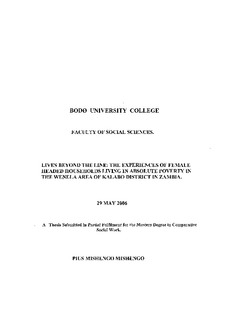| dc.description.abstract | This study was meant to explore the Iife experiences and coping mechanisms of female
headed housel~olds living in absolute poverty in the Wenela area of Kalabo District in
Zambia.
The study was undertaken between November and December, 2005. Data was collected
using qualitative research rnethods and involved eight respondents.
The study revealed that HIV/AIDS and the culture of property inheritance are some of the
major contributing factors to the high levels of poverty among female headed households
in the Wenela area.
Female headed households in the study reported spending a good portion of their meagre
resources on caring for their sick children and their parents after having already spent a
lot on their deceased husbands' illnesses and burial expenses. They fiu-ther reported that
their capacity to engage in income generating activities is constrained by the time spent
on caring for their sick relatives and the limited investment resources spent on medical
expenses.
The study found that many female headed households struggle to cope with HIV/AIDS
related illnesses and deaths. Respondents reported that they are overburdened by the
number of orphaned children they are taking care of.
The study further revealed that female headed households are unable to access support
from the traditional social support networks which used to provide both economic and
social support to vulnerable women in the past as they are ovenvhelmed and
overstretched by the magnitude of poverty arnong vulnerable groups.
The study also found that thc culture of property inheritance has gxeat consequences for
fcmalc hcaded households as the system deprives them of the vcry much needed assets
and resources to for them to continue living normal Iives.
The study findings indicate that as a result of inadequate support from traditional social
networks, non-govemmental organisations and the goven~rnent, female headed
houscholds employ vaiious basic family strategies in order to make ends meet. Some of
the strategies include; doing casual work, selling assets, prostitution, withdrawing
children froin school, reduction in consuinption and expenditure and undertaking some
small scale incoine generating ventures. Most of these coping mechanisms were found to
be perpetuating poverty.
Finally, the study found out that female headed households are not only poor due to
illness and death, but they are als0 poor because they are deprived the power to access,
control and command their resources. | en |
